We recently talked to the very accessible Remigiusz Michalski about some of the more burning questions relating to his horror adventure game, Downfall. In our interview, we touch on his feelings about being an indie developer – including how Steam had shockingly outright rejected the game as unfit for their audience – and how the game’s style and structure really came about. Michalski also clarifies how the game relates to the adventure game genre all the while gently jabbing poor Guybrush.
The interview additionally contains never before seen side-to-side comparisons of development sketches and exclusive versions of backgrounds - including unfinished art that never made it to the game - to allow readers more insight into Michalski’s development cycle.
Here at the Slowdown, we also noticed how some players have been on the fence with the amount of gore in the game, so we wanted Remy to clarify the true nature of the horror present in Downfall. In turn, we also learned how some of the game and its locations are really reality-based.
Finally, we intend to publish our complementary review of the game, with more in-game screenshots to go, in a matter of a few days; If you’re interested in the game, the easiest way to read the forthcoming review is to subscribe to us on Twitter or to our RSS feed. Downfall is currently available on Direct2Drive, and our thank you goes to Mr. Michalski for taking the time to answer our questions.
Your game, Downfall, is very much a one-man multimedia project. Was it a conscious decision to develop it by yourself?
Well, it’s not like I had much choice: None of my friends are into games. The game started as an experiment that turned better and better, and eventually the pieces started to fit together. It would be unfair to call it a one-man project though, as my brother Michal did a great job with recording the soundtrack, which – despite of being very different from what I initially imagined – fits the atmosphere of the game rather well.
Additionally, there was the AGS forum community, which occasionally lent me a hand with technical issues. Having worked alone for most of the time, though, I had the freedom to develop the story and character design exactly the way I wanted, without other people telling me what to do.
I had to trust my instincts, and in the end, I do feel I made the right decisions.
Did the psychological nature of the game’s subject matter constrain the the potentiality (or potential need for) of collaboration, or do you simply enjoy working alone?
I definitely enjoy working alone. I suspect it wouldn’t be possible to create such a deep and personal story if there were more people involved in its conception. That may very well be the best thing about indie games: In some way, they do reflect their makers’ personalities.
That is not something you get with big-budget blockbuster titles developed by teams of a hundred or more people. They have to make sure their games are politically correct and inoffensive. If Downfall does end up offending someone, I couldn’t care less! At least I am being honest, and you can either love or hate Downfall for it.
I understand you worked on Downfall on the side of - even at - your day job. Did this inspire you, or was it ultimately a hindrance?
Large parts of the game were done during long night shifts in a nursing home I worked at. It was one of those places where mentally ill elderly come to spend their last years. I did my best to look after them, but I also saw a lot of them perish. After a while you get used to it – try to help them make the most of the time they’ve got left; but the very fact of human death isn’t so much of a shock any more.
It gave me a great insight into what mental illness does to you and how it makes you behave… of course I was inspired by it! Some of the things Joe’s wife says in the game are based on real conversations I had with patients. Many locations in the game have been initially drawn in that building and basically some of the backgrounds are based on rooms that I’d known for years.
I found that with many litres of coffee and a packet of cigarettes you don’t need to sleep at all. The quiet gave me the opportunity to concentrate, which isn’t always the case during the day.
That begs the question, how did you actually come to settle on the format of an adventure game in telling this particular narrative - instead of, say, a novel, a comic book or a film?
It was going to be an adventure game from the start, there was no question about it.
I bumped into the AGS website a long time ago and I made my first little project for – and about – my friends only. They loved it. It was a damn funny game, but with rubbish quickly drawn graphics. I realized that I loved the platform though, and through all the years that followed I kept thinking about the ideas for a proper game that could attract a broader audience.
Comic books and films were never my thing, but games, of which I’m a real enthusiast, seemed like a perfect medium for me. I could finally fulfil my childhood dream of becoming a writer and combine it with some artistic skills which I possessed but never really used much. That way, I guess, I made the most of all my skills.
Would you consider Downfall a ‘return’ to tradition? Could you have imagined Downfall in some other format than low-resolution point & click?
Downfall is definitely a return to tradition, in regards to the puzzles, dialogues and the inventory. The phrase I used somewhere to describe it, “back to the roots of adventure games”, was not taken very well by some people though, who probably imagine that every game in the genre must tell a story of a wannabe pirate searching for a long lost treasure.
I also dislike how most adventure games these days are too easy and consist of strings of mini-games rather than making the players figure out how to achieve proper objectives in their surroundings.
The low resolution was dictated by the simple fact that I was working alone and it was easier for me to make it this way. It’s all very retro, but then again, once in a while there are scenes in the game that you would have never seen in games of the past: Full-screen animated sprites, camera zooms, multi-layered rain effects with each and every frame hand-drawn individually.
The game is currently a Direct2Drive exclusive. Are you planning on extending its availability to other channels of distribution like Steam?
I am thinking about it. Direct2Drive have been very helpful, as they guided me through the publishing process – which I had no idea about – and I am most grateful for that – so I’m going to keep the game exclusive to D2D for a little longer still, and then expand to other portals.
I doubt Steam will be one of them though. They turned me down in the past without even having a look at the product. They said their audience would not like this sort of game… I am getting lots of offers from other portals now, though, and eventually I will start thinking about it.
The marketing discourse for Downfall has firmly established the game as graphic and ultra-violent; Would you agree with me, though, that the real ‘horror’ aspect of Downfall isn’t all about the gore?
Downfall is a very scary game, but not because of the gore. It’s the combination of all its elements that makes it a one-of-a-kind experience about someone trying to help, but unwillingly causing more damage instead. The violence isn’t there necessarily to scare anyone; we are all used to seeing blood and monsters in games, after all.
It’s the little things in Downfall that you might find more disturbing: The sound of a crying woman in one of the rooms, the fact that you can kill someone, by mistake, and they will stay dead until the end of the game. The dreams. Strange figures in the cellar, hidden under dirty sheets… they don’t always have to mean or do something. They’re just there to make you think, to create images in your head that can be more frightening than any monster in the history of games.
As we mentioned before, Downfall is a very personal, invested work. Keeping this in mind, does the game scare you in some (any) way?
It only scares me when I think how very personal it is! Seriously speaking, no, it does not. There was just that one time… I had my headphones on, and there’s a part of the game where a lamp gets smashed and the whole room goes dark…
The sound of broken glass, very loud in my ears, made me jump out of my seat as I completely forgot it was supposed to happen! Ultimately, I spent too much time working on the game to be scared of it any more. It’s a shame. I know one player had a really bad nightmare after playing Downfall, though. It was something to do with the cellar I mentioned earlier.
The game does contain themes - eating disorder, child abuse, the loss of love - often absent in computer games. Was Downfall’s conception motivated by a desire to discuss these topics in the interactive realm?
Yes, these topics have been often exploited by the films, but rarely (never?) used in games. In this case, I tried to talk about the things I have some knowledge of. I believe this is what makes Downfall unique. There’s way too much repetition in games.
There should be more games for adult players, and Downfall is definitely a mature title they will enjoy on an intellectual level. I didn’t want to discuss problems I’ve never experienced or witnessed because they’d feel fake. And the horror setting is pretty much just a metaphor used to emphasize situations that can and do happen in real life.
Joe, the primary protagonist, seems motivated by the need to keep his life fixed “as is”, in a stasis. Would you say this tendency is fuelled on by his closest relationships in the game?
Of course. All Joe wants is to get his old life back. In the same time he’s fooling himself thinking that it was ever good. This tendency is very typical to him. At the same time everyone he meets on his way tries to drag him away from it…
It’s quite enthralling how the aforementioned facet of Joe - the need to fix, mend and repair - makes him, really, the ideal character for an adventure game. Was Joe always the focus of the game?
Joe is obviously a very important character, but I think it’s his wife, Ivy, who’s even more important to the story. She provides the reasoning behind his every action and she is his ultimate downfall. To some players it might seem that she goes missing early in the game, but really, if you look closely, there’s a little bit of her in every person you meet as you explore the hotel…
A protagonist in an adventure game needs something to drive him or her forward, to explain the constant search for clues, and in a way that’s how Joe is; His goals are very clear. I was afraid that compared to other, more complex characters, Joe would appear to lack his own opinions and originality in general, because it’s the player who chooses for him and his behaviour might change according to player’s decisions.
But in the end, that’s what makes him seem more human. He’s not perfect, he makes wrong decisions, he hesitates, gets angry or tired. By the time the credits roll, you will have your own picture of Joe, and it might be quite different from what other players have seen.
How important do you think it is to have multiple playable characters in Downfall? How early did you settle on the idea that Joe’s perspective is not all there is to the story?
I think it’s quite important. Without it Downfall would be just too heavy and depressing. When the perspective changes to Agnes when you least expect it, the game suddenly takes on a more relaxed approach, a moment to breathe and unload the tension.
Not for long, mind you, because you soon realize that it’s too late to go back and change what you’ve done as Joe, and the consequences of your actions can be rather horrible. Another, more obvious, reason for including this feature is of course to explain the story a bit more. There are quite a few twists in Downfall, after all.
Did the design for the game change during the development process? Do you have any examples of changes that occurred since its inception?
To be honest, the only thing I had to go back to and change was Joe. About halfway through the development, I decided I didn’t like how he looked… it effectively meant I had to draw this character again and change most of his animations too. Because I based “New Joe” on the “Old Joe”, you can occasionally see few frames left from the old design in some of the animations.
In regards to the location (Devon, UK), how did the setting come about?
This is where I live! [Ed: GASP!] It doesn’t really matter much. All that’s said in the game is that Joe and his wife come from London and Devon is where they wanted to take some time off and relax. The empty rainy town where they decide to stay for the night is completely fictional.
Your treatment of the topos of the haunted house greatly differs from the usual; how important is the Quiet Haven Hotel for the actual narrative?
Quiet Haven is more than a building. I can only tell that it is a metaphor, and definitely NOT one of those haunted houses “built on ancient Indian burial ground”. It’s a mental trap and a journey to the Joe’s past.
Apparently, some people think the hotel’s name is a tribute to Silent Hill’s “Silent Heaven” hotel. I do love Silent Hill, but never really thought about that this way. The name has a deeper meaning. The first words Joe says in the game are: “Great… The storm is coming”.
But it’s more than rain and thunder that are coming. It’s a storm that takes place inside Joe’s mind more than anywhere else. He seeks a shelter and there it is, a hotel, a safe haven. He tries to run away from his problems, lying to himself, because he already knows something very bad is about to happen…
Earlier, I asked about the choice of utilizing ‘game’ as the vessel for the story. We’ve established, over the course of this interview, that Downfall does contain themes atypical to games. What do you think of the games-as-art discourse? Do you consider Downfall an ‘art’ game?
Yeah, it’s definitely an art game, even though the gamers’ first impression after watching the trailer was that it’s a game that uses violence as a selling point. The truth is many artists used violence and that’s okay as long as there is a good reason for it and it means something more than just blood and guts.
It would really surprise me if someone who finished Downfall didn’t get that message! I think art is the right direction, we just have to make sure we don’t label every new game as “art” because the producer said so, and I’m afraid that was the case with quite a few titles.
I understand you’re preparing an updated version of the game. What would you like to tell new potential players about the forthcoming version?
A new version, 1.4, is done and soon available on Direct2Drive - if you see version number “1.4” at the bottom of the page it means it’s available. The patched version includes spelling corrections, some major bug fixes, a new font and is generally more polished. Those who have bought the previous version can email me for an update.
Finally, what are your immediate plans for either Downfall or for future projects?
I’m still focusing on Downfall at the moment, but there will be a subsequent project, of course. It’s still in the planning stages though, and I can’t tell you much about it, apart from it being another horror story.


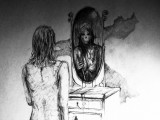
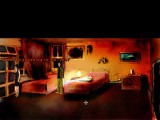





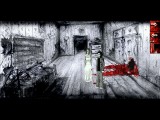
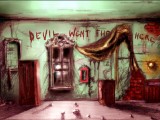
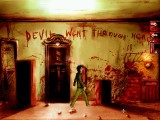
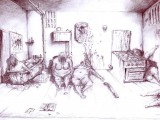
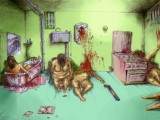
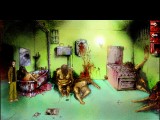
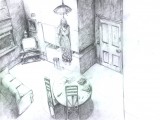
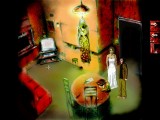
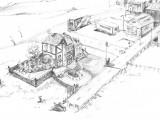
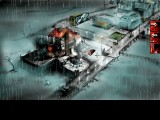
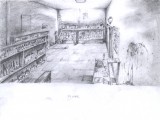
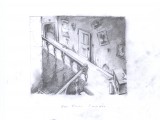
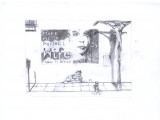
[…] about the intriguing Horror-adventure Downfall before - but relatively new site the Slow Down has interviewed its creator, taking in all the problems of Indie Development and publishing, the tradition of 2D graphic […]
[…] An interview with Remigiusz Michalski on the Slow down! concerning Downfall and how it came to be. Very interesting read. Michalski also mentions a new project: another horror game. […]
[…] our review of Downfall below, you could also view an alternate take on the game in the form of our interview with the game’s developer Remigiusz Michalski. The interview contains intriguing side-to-side comparisons of Michalski’s work-in-progress […]
[…] game largely by himself, partially while in a nursing home filled with the mentally ill elderly. (Interview Here). Mr. Michalski attests that some parts of the game are inspired by events in his life, if somewhat […]
IM stuck and i tried everything,i want to know if there is a walkthroug.please help me :(
I’ve tried out the demo…
Oh! man, I’m 28 years old and I don’t usually get scared for whatever reason, but this game completely trapped my attention and so then it got me jumping off my seat…
Remigiusz Michalski is a great artist and a great mind… really, really thank you for bringing this game to life…
PS: I’m going right to the purchase site to get a full copy of Downfall!!!
First of all, let me explain I write from Brazil, more next to Argentina than to Rio, altough living in a big city too. Said that, I apologize my english writing. Apologize, either, for being a “bad buyer”, because here, in Brazil, we have one of the poorest market and tradition for Adventure Games! I´m 36 years old and I´m after these genre of gaming exclusively, soon as my 15 years and MSX, “La Abadia del Crimen..”.
I´m writing this to, honestly sayng, CONGRATULATE this site for its first and well done object: THINK about these games even more than playing them! I agreed 100% with this kind of attitude, rarely seen other places at all! I may have liked more some adventures I played because of the long reviews of some well-known websites that playing them instead!
And fact is: I have PLENTY to talk or write about theses games, but I cannot find the appropriate place! (Maybe This night I found it, Here!?)
It´s very hard to write so much and with all complexity we want to transmit in another language, even though I can compreehen very well the adventures themselves (subtitled, always! please!).
The second reason I´m writting here is to congratulate the Author of THIS game too, even thoug I had not played it yet (Of course, I will, the day that came to be). But the images seen in the reviews, the story, the aproach, it´s FULFILLING! Believe me or not, but not only (not even) because of the reviews themselves, of this website or others, but in spite, for the things we can learn undoubtedly at all! This game is a WINNER. One of the things I would like so much to do is to spread all over information about games this style, mature intended (not for the violence, but for the story, maybe for the lack of pure funny amusement, maybe for it bitterness, maybe for touching facts of life not seen in corporated sellers, worried to not cause bad feelings at their costumers - well said by Downfall Author!).
The third thing that made me write down all this here, is to ask if I can get contact with Mr. Michalski himself, cause I frequently get myself mind-writing plots for adventure games, in general, with more deep and sensitive approaches too, but, as I first wrote here, in Brazil there´s NO WAY some “underground” amateur writer could put his efforts in the creation of an Adventure Game that really could end up being…LAUNCHED, FINISHED. People, around here, would certainly worry all they can about the “investiment” thing, the public acceptability, the no-offending thing, the marketably correct. I´m just tired in insist that. Maybe I could try helping an actually adventure-DOER to make something, even if I would have to break my brains out explaining complex thoughts in a language that´s not my native.
Please, SLOWDOWN people! CONTINUE THAT WAY! I will start browsing the rest of your website just Now that I finish writing.
Give my appeal a chance, too! Put me in contact with this Remigiusz guy, if you can (and if he will it too, of course).
Good day and good life!
Luis Rafael Ribeiro
[…] designer Remigiusz Michalski, whose previous game “Downfall” was designed in an elderly home “…where mentally ill elderly come to spend their last years.” I am unaware if Michalski still works there, but given the kind of game “The Cat Lady” is, I […]